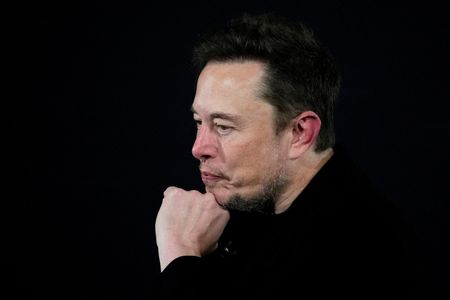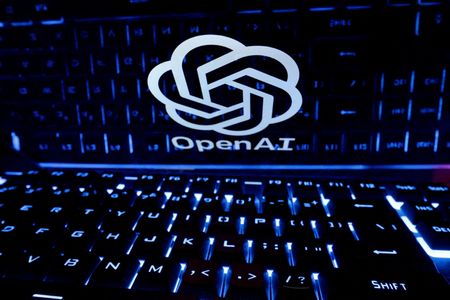By Aditya Soni and Abinaya V
(Reuters) – OpenAI on Tuesday hit back at Elon Musk’s claims that the startup abandoned its original mission with emails that showed the billionaire supported its plan to create a for-profit entity and wanted a merger that would make Tesla its “cash cow.”
Musk, one of the co-founders of OpenAI, filed a lawsuit last week, alleging the startup breached their founding agreement to develop artificial intelligence for the benefit of humanity, rather than for profit, by partnering with Microsoft.
OpenAI’s other co-founders including Sam Altman, Greg Brockman and Ilya Sutskever said they would move to dismiss all of his claims, in a blog post that contained emails sent by Musk.
“We’re sad that it’s come to this with someone whom we’ve deeply admired – someone who inspired us to aim higher, then told us we would fail, started a competitor, and then sued us when we started making meaningful progress towards OpenAI’s mission without him,” they said.
OpenAI had agreed on the for-profit entity in 2017 after realizing its non-profit structure would not be able to able to support the development of artificial general intelligence (AGI), a concept that machines could handle tasks like humans, according to the post.
“ONLY PATH”
“As we discussed a for-profit structure in order to further the mission, Elon wanted us to merge with Tesla or he wanted full control,” OpenAI said, adding that “we couldn’t agree to terms on a for-profit with Elon because we felt it was against the mission for any individual to have absolute control over OpenAI.”
“In early February 2018, Elon forwarded us an email suggesting that OpenAI should ‘attach to Tesla as its cash cow,’ commenting that it was ‘exactly right… Tesla is the only path that could even hope to hold a candle to Google.'”
The emails suggested Musk agreed that OpenAI’s mission did not mean the startup would share all its technologies, including AGI.
He responded with “Yup” to a 2016 mail from Sutskever saying that “as we get closer to building AI, it will make sense to start being less open,” according to the emails posted on the blog.
Sutskever had said OpenAI’s mission meant everyone should benefit from AI, but that it was “OK” not to share the science, even though sharing everything was the right strategy for recruitment initially.
Musk and Tesla did not respond to Reuters requests for comment on the blog, but Musk said on X about Sutskever’s mail, “OpenAI is living a lie.”
Tesla shares were down nearly 4% on Wednesday.
“(Musk) saw something early at OpenAI that he thought could benefit Tesla. At this point, the lawsuit seems like a frivolous distraction for the main mission at Tesla,” said Craig Irwin, senior research analyst at Roth Capital.
OpenAI also said Musk had pushed the startup to be more aggressive with fundraising, with the Tesla CEO wanting a $1 billion funding round for the startup in 2015, after Altman and Brockman initially planned to raise $100 million.
In total, the non-profit has raised less than $45 million from Musk, according to the blog post.
OpenAI’s responses hit at the heart of the lawsuit filed late on Thursday in California Superior Court in San Francisco.
The lawsuit had marked a culmination of Musk’s long-simmering opposition to the startup. Since he left the startup, OpenAI has become the face of generative AI, while Musk went on to found his own AI startup, xAI, which was launched last July.
Some legal experts said Musk’s allegations of breach of contract, based partly on an email between Musk and Altman, might not hold up in court.
(Reporting by Abinaya Vijayaraghavan in Bengaluru; Editing by Rashmi Aich and Anil D’Silva)


